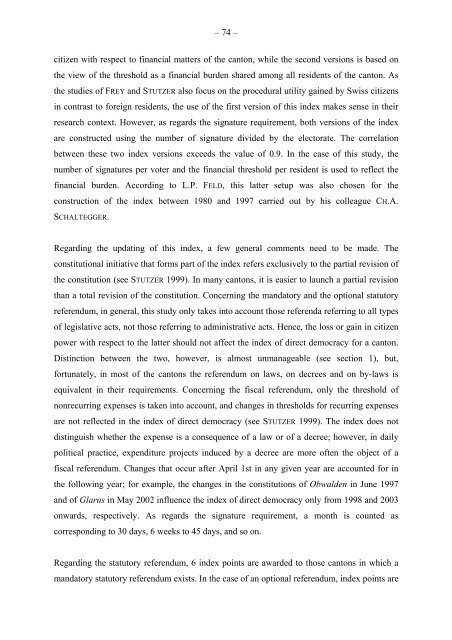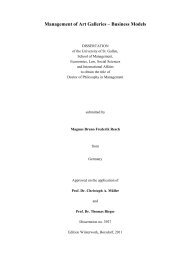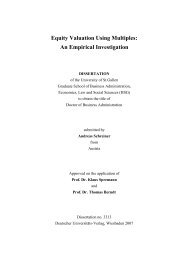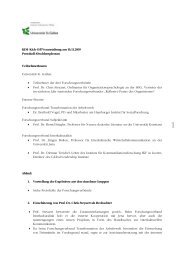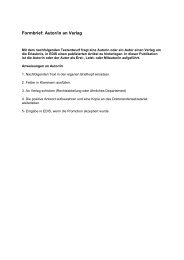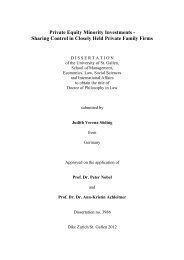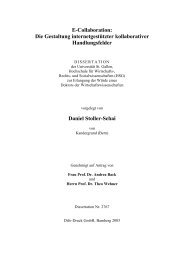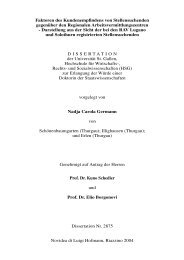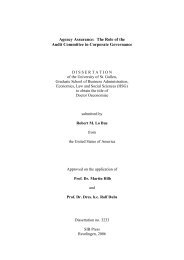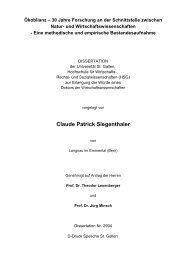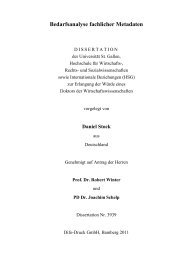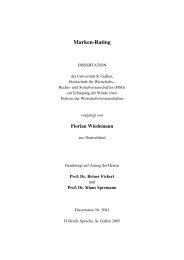The Impact of Direct Democracy on Society - Universität St.Gallen
The Impact of Direct Democracy on Society - Universität St.Gallen
The Impact of Direct Democracy on Society - Universität St.Gallen
- No tags were found...
You also want an ePaper? Increase the reach of your titles
YUMPU automatically turns print PDFs into web optimized ePapers that Google loves.
– 74 –citizen with respect to financial matters <str<strong>on</strong>g>of</str<strong>on</strong>g> the cant<strong>on</strong>, while the sec<strong>on</strong>d versi<strong>on</strong>s is based <strong>on</strong>the view <str<strong>on</strong>g>of</str<strong>on</strong>g> the threshold as a financial burden shared am<strong>on</strong>g all residents <str<strong>on</strong>g>of</str<strong>on</strong>g> the cant<strong>on</strong>. Asthe studies <str<strong>on</strong>g>of</str<strong>on</strong>g> FREY and STUTZER also focus <strong>on</strong> the procedural utility gained by Swiss citizensin c<strong>on</strong>trast to foreign residents, the use <str<strong>on</strong>g>of</str<strong>on</strong>g> the first versi<strong>on</strong> <str<strong>on</strong>g>of</str<strong>on</strong>g> this index makes sense in theirresearch c<strong>on</strong>text. However, as regards the signature requirement, both versi<strong>on</strong>s <str<strong>on</strong>g>of</str<strong>on</strong>g> the indexare c<strong>on</strong>structed using the number <str<strong>on</strong>g>of</str<strong>on</strong>g> signature divided by the electorate. <str<strong>on</strong>g>The</str<strong>on</strong>g> correlati<strong>on</strong>between these two index versi<strong>on</strong>s exceeds the value <str<strong>on</strong>g>of</str<strong>on</strong>g> 0.9. In the case <str<strong>on</strong>g>of</str<strong>on</strong>g> this study, thenumber <str<strong>on</strong>g>of</str<strong>on</strong>g> signatures per voter and the financial threshold per resident is used to reflect thefinancial burden. According to L.P. FELD, this latter setup was also chosen for thec<strong>on</strong>structi<strong>on</strong> <str<strong>on</strong>g>of</str<strong>on</strong>g> the index between 1980 and 1997 carried out by his colleague CH.A.SCHALTEGGER.Regarding the updating <str<strong>on</strong>g>of</str<strong>on</strong>g> this index, a few general comments need to be made. <str<strong>on</strong>g>The</str<strong>on</strong>g>c<strong>on</strong>stituti<strong>on</strong>al initiative that forms part <str<strong>on</strong>g>of</str<strong>on</strong>g> the index refers exclusively to the partial revisi<strong>on</strong> <str<strong>on</strong>g>of</str<strong>on</strong>g>the c<strong>on</strong>stituti<strong>on</strong> (see STUTZER 1999). In many cant<strong>on</strong>s, it is easier to launch a partial revisi<strong>on</strong>than a total revisi<strong>on</strong> <str<strong>on</strong>g>of</str<strong>on</strong>g> the c<strong>on</strong>stituti<strong>on</strong>. C<strong>on</strong>cerning the mandatory and the opti<strong>on</strong>al statutoryreferendum, in general, this study <strong>on</strong>ly takes into account those referenda referring to all types<str<strong>on</strong>g>of</str<strong>on</strong>g> legislative acts, not those referring to administrative acts. Hence, the loss or gain in citizenpower with respect to the latter should not affect the index <str<strong>on</strong>g>of</str<strong>on</strong>g> direct democracy for a cant<strong>on</strong>.Distincti<strong>on</strong> between the two, however, is almost unmanageable (see secti<strong>on</strong> 1), but,fortunately, in most <str<strong>on</strong>g>of</str<strong>on</strong>g> the cant<strong>on</strong>s the referendum <strong>on</strong> laws, <strong>on</strong> decrees and <strong>on</strong> by-laws isequivalent in their requirements. C<strong>on</strong>cerning the fiscal referendum, <strong>on</strong>ly the threshold <str<strong>on</strong>g>of</str<strong>on</strong>g>n<strong>on</strong>recurring expenses is taken into account, and changes in thresholds for recurring expensesare not reflected in the index <str<strong>on</strong>g>of</str<strong>on</strong>g> direct democracy (see STUTZER 1999). <str<strong>on</strong>g>The</str<strong>on</strong>g> index does notdistinguish whether the expense is a c<strong>on</strong>sequence <str<strong>on</strong>g>of</str<strong>on</strong>g> a law or <str<strong>on</strong>g>of</str<strong>on</strong>g> a decree; however, in dailypolitical practice, expenditure projects induced by a decree are more <str<strong>on</strong>g>of</str<strong>on</strong>g>ten the object <str<strong>on</strong>g>of</str<strong>on</strong>g> afiscal referendum. Changes that occur after April 1st in any given year are accounted for inthe following year; for example, the changes in the c<strong>on</strong>stituti<strong>on</strong>s <str<strong>on</strong>g>of</str<strong>on</strong>g> Obwalden in June 1997and <str<strong>on</strong>g>of</str<strong>on</strong>g> Glarus in May 2002 influence the index <str<strong>on</strong>g>of</str<strong>on</strong>g> direct democracy <strong>on</strong>ly from 1998 and 2003<strong>on</strong>wards, respectively. As regards the signature requirement, a m<strong>on</strong>th is counted ascorresp<strong>on</strong>ding to 30 days, 6 weeks to 45 days, and so <strong>on</strong>.Regarding the statutory referendum, 6 index points are awarded to those cant<strong>on</strong>s in which amandatory statutory referendum exists. In the case <str<strong>on</strong>g>of</str<strong>on</strong>g> an opti<strong>on</strong>al referendum, index points are


